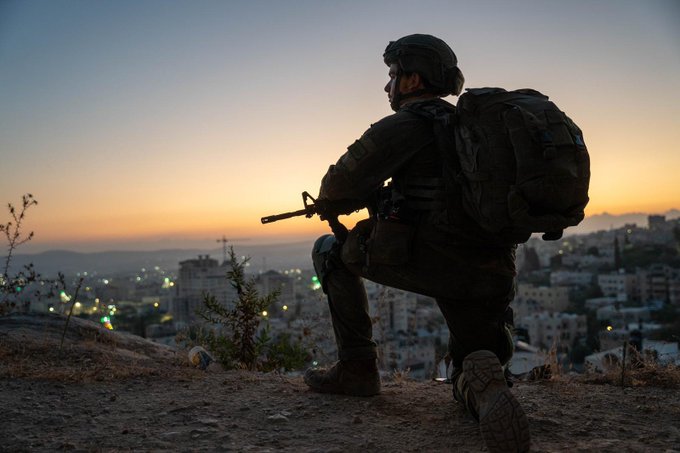Four days ago, large IDF forces, with assistance from the Shin Bet, launched a major operation against armed terrorist groups in northern Samaria and the Jordan Valley.
The IDF’s efforts are concentrated in Jenin, Tulkarm, and the Al-Farah refugee camp in the Jordan Valley.
These terrorist groups, established over the past three years by Iran with support from Hamas and Islamic Jihad, have taken control in areas like Jenin, Tulkarm, and Nablus, pushing out the PA security forces.
According to Israeli security sources, between 800 to 1,000 armed terrorists, equipped with weapons and explosives smuggled from Iran via the Jordanian border, are operating in these regions.
Organized into battalions and funded by Iran, they are referred to in security jargon as “Iran’s terrorist army.”
This new force was founded by General Hossein Salami, commander of Iran’s Revolutionary Guards, in collaboration with Ziad Al-Nakhala, Secretary General of the Islamic Jihad Organization, and Saleh al-Arouri, the former Hamas military wing commander, who was assassinated in Beirut.
Recently, these groups have escalated their use of explosive devices, setting up laboratories to produce large explosives and suicide belts.
They plant these devices on roads frequented by security forces and settlers.
So far, IDF operations have uncovered numerous explosives, including several weighing 100 kg each.
The political echelon decided to launch the operation as a preemptive strike following the Tel Aviv attack and Hamas’s announcement of renewed suicide bombings within Israel.
Intelligence suggested that a terrorist squad was planning to infiltrate an Israeli settlement in northern Samaria to carry out massacres similar to those in settlements around Gaza on October 7, accelerating the decision to proceed with the operation.
Operation “Summer Camps” is the largest campaign in Judea and Samaria against terrorism in the past 20 years, since Operation “Protective Shield” in 2002.
Senior security officials emphasize that the operation aims to obliterate the terrorist battalions’ capabilities, dismantle their infrastructure, seize weapons, and apprehend wanted individuals.
The Shin Bet is working closely with IDF soldiers on the ground, with dozens of handlers and investigators operating sources in the field, interrogating detainees, and providing real-time intelligence to IDF commanders.
So far, the IDF has neutralized dozens of terrorists, including Muhammad Jaber, aka “Abu Shuja’a,” the head of Islamic Jihad in Tulkarem, responsible for numerous attacks, including the murder of Israeli citizen Amnon Mokhtar.
Also eliminated was Wissam Hazem, the head of Hamas in Jenin.
The operation has resulted in dozens of terrorists being injured and several dozen more arrested. It is ongoing and has no set end date.
Two IDF brigades are participating in the operation, supported by special forces, covert units, and UAVs that target armed terrorists from the air.
Senior security officials assert that the IDF must secure the border with Jordan, from which Iran smuggles weapons and explosives into northern Samaria.
Failure to do so could render the operation’s effects short-lived.
Chief of Staff Herzi Halevi is expected to decide soon on the establishment of a new division to be deployed from the northern Jordan Valley to the Arava region, to curb terrorist smuggling and infiltration into Israel.
Iran’s terrorist army is also attempting to expand its activities to Bethlehem and Hebron. Over the weekend, a double car bomb attack was attempted in the Gush Etzion area but was foiled, resulting in three Israelis being injured.
Iran continues to pour money and weapons into the region. Ten days ago, Israel killed Khalil Makdeh, a Fatah military wing operative involved in smuggling weapons to Judea and Samaria, in coordination with Iran’s Quds Force, in Lebanon’s Sidon region.
The PA’s Stance on the IDF Operation
The IDF initiated this major operation because the Palestinian Authority (PA) ceased its efforts against the terrorist battalions three years ago, after they were established.
A senior PA official stated that PA Chairman Mahmoud Abbas has directed not to confront these groups, despite the PA having 40,000 armed fighters, as long as they do not threaten the Muqata’a in Ramallah.
Chairman Abbas argues that a confrontation could lead to civil war, a legacy he does not want to leave in Palestinian history.
Operation “Summer Camps” highlights the significant failures of the Oslo Accords, the security coordination between Israel and the PA, and the concept that the PA would combat terrorism.
The PA not only refuses to fight terrorism but also encourages it through its education system, official media, and by paying salaries to terrorists and their families.
The biggest concern within the security establishment is that the weak, corrupt, and unpopular PA could collapse, leading its thousands of armed security personnel to join Iran’s terrorist army, using their weapons against IDF soldiers and launching raids on Israeli settlements.
Senior security officials stress that while the operation is crucial, more aggressive measures are needed to halt the spread of Iran’s terrorist army throughout Judea and Samaria and to prevent a new armed intifada.
The IDF must revise its rules of engagement for dealing with armed terrorists, particularly those participating in masse in funerals, and adopt methods used in Gaza, such as mass evacuations of Palestinian populations from refugee camps to “safe areas” to eliminate terrorist infrastructure.
Since October 7, more than 640 Palestinians, most involved in terrorism, have been killed in Judea and Samaria. This number is expected to rise significantly in the coming days.




